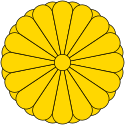1993 Japanese general election
| |||||||||||||||||||||||||||||||
All 511 seats to the House of Representatives of Japan 256 seats needed for a majority | |||||||||||||||||||||||||||||||
|---|---|---|---|---|---|---|---|---|---|---|---|---|---|---|---|---|---|---|---|---|---|---|---|---|---|---|---|---|---|---|---|
| |||||||||||||||||||||||||||||||
| |||||||||||||||||||||||||||||||
| This article is part of a series on |
 |
|---|
|
|
Japan held a nationwide election to the House of Representatives, the more powerful lower house of the National Diet, on July 18, 1993.
Overview
The consumption tax and the Recruit scandal seriously affected the popularity of the long-time ruling Liberal Democratic Party. Along with the opposition MPs, members of some factions of the LDP cast a vote of no confidence against prime minister Kiichi Miyazawa; in response Miyazawa decided to dissolve the House of Representatives. Some LDP dissidents then left the party and formed new parties.
Results
The ruling Liberal Democratic Party lost its overall majority for the first time since 1983 and also failed to form the government for the first time since 1955. They were replaced by an eight-party alliance headed by Morihiro Hosokawa, who was elected prime minister. Template:Japan general election, 1993
